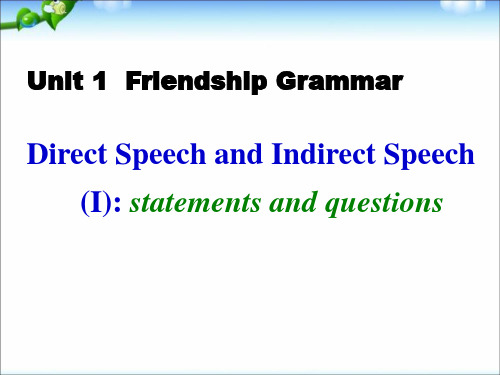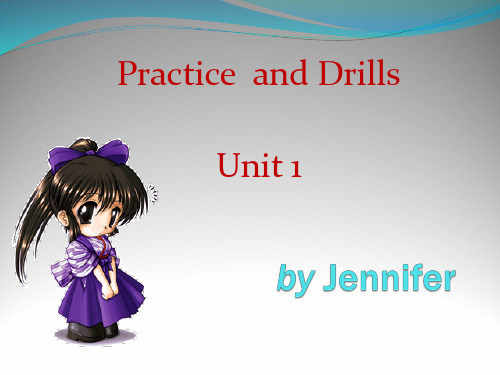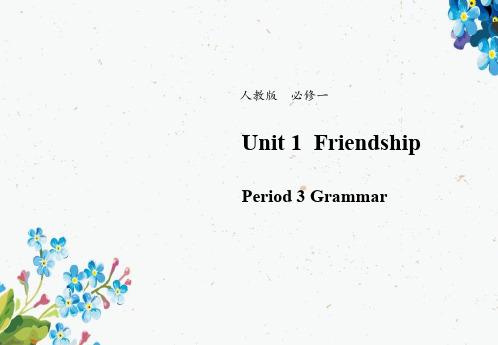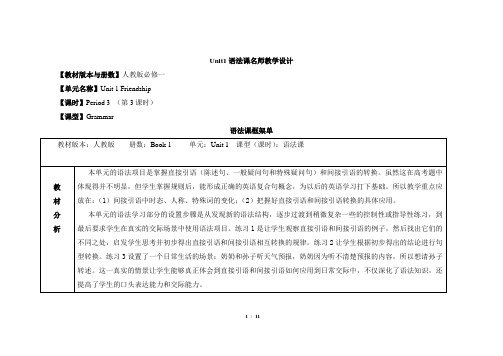人教新课标高中英语必修1教学课件:U1 Grammar quiz
人教版高中英语必修1 Unit1 Friendship Grammar(共52张PPT)

How to change direct speech into indirect speech?
a. Change what has been said to an object clause or an infinitive phrase;
2. 经常的习惯 He said to the doctor, “I smoke two packs every day.” → He told the doctor that he smokes two packs every day.
3. 历史事件 The teacher said, “World War II ended in 1945.” → The teacher said that World War II ended in 1945.
He said, “I lost a key here yesterday.” He said that he had lost a key there the day before/the previous day.
“I read the book here a week ago,” Jane said to him. Jane told him that she had read the book there a week before.
When do you harvest the wheat? (They asked him)
you harvest the wheat
They asked him when you harvest the wheat.
he harvveesstteedd
人教版必修一unit1Grammar课件(共20张)

1、人称的变化
口诀
一随主,二随宾,第三人称不更新
直接引语 间接引语
说明
引号内的第一人 称变间引后与主 句主语的人称保 持一致 引号内的第二人 称变间引后与主 句宾语的人称保 持一致
一 随 主 二 随 宾
She said,“ I like Tennis.”
She said that she liked tennis.
2. He asked her,“Where are you going?” He asked her ____. A. where she were going B. where she was going to C. where she was going D. where she is going
III Practice
Try to do SB P.5 Ex.2 Change the sentences either into direct speech or indirect speech:
1. Anne said that she didn’t know the address of her new home. 2. Anne told her father that she had got tired of looking at nature through dirty curtains and dusty windows. 3. The girl said that she needed to pack up her things in the suitcase very quickly. 4. Her father asked her why she chose/ had chosen her diary and old letters.
新课标人教版必修一 Unit1 Grammar

Step 2: Deal with 课本P5 Ex2
1. Anne said (that) she didn’t know the address of her new home. 2. Anne told her father (that) she had got tired of looking at nature through dirty curtains and dusty windows. 3. The girl said that she needed to pack up her things in the suitcase very quickly. 4. His father asked her why she had chosen her diary and old letters. 5. Mother said to her : “ Are you very hot with so many clothes on ?” 6. “What else did you hide under your overcoat ?” Margot asked her. 7. “When shall we go back ?” Anne asked her father. 8. “ Why did you talk so much to this boy ?” Father asked Anne.
2012-12-12
2. She suffered from loneliness, but she had to learn to like it there. 她遭受孤独的折磨,但是她得学会喜欢呆在那里。 suffer vt. 遭受;忍受;经历,后面常接pain, defeat, loss, poverty, hunger等名词。 vi.受痛苦,患病。常用suffer from结构。 ① Iraq suffered serious damage from the war. 伊拉克因战争而遭受了严重的破坏。 ② He is suffering from cancer. 他患上了癌症。 3. How can Linda recover from her illness in this room ? 琳达在这个房间里怎么能够从病中康复呢……? recover vi.& vt. 痊愈;恢复;重新获得,常与介词from 连用。 ① I think he will recover from her bad cold soon. 我想不久他的重感冒会好的。 ②Jane recovered her lost wallet. 简找到了丢失的钱包。
人教课标版高中英语必修1Unit1_Grammar_优教教学设计

Unit1 Grammar 优教教学设计Direct Speech and Indirect Speech(Ⅰ): statements and questions教学设计设计意图This is the last teaching period of this unit, aiming to help students get a basic knowledge of the grammar in this unit. The emphasis of this period is mainly placed on understanding and using the grammar. Therefore, teachers should create a relatively real context to present enough sentences for students to draw a conclusion about the rules of how to change direct speech into indirect speech in declarative sentences. In the meantime, teachers should offer more opportunities for students to practice. Exercises ought to be simple and easy to operate, which is connected with their daily life to make it easy to understand.教学重点Enable students to change direct speech into indirect speech properly.教学难点Guide the students how to use direct speech and indirect speech in real situations.教学过程Lead-inGreet students and ask some of them several questions. After that, get others to report what they said just now.T: Hello, everyone! How are you today?Ss: Fine.T: Tom, I heard that you were ill yesterday. How are you feeling now?Tom: I am feeling better now, thank you.(At that moment, the teacher wrote down on the blackboard what Tom said in direct speech.)T: That’s good news. Mary, can you report what Tom said just now?Mary: Tom said that he was feeling better then.T: What’s your favorite hobby, Mary?Mary: I like playing the piano best.(Write down on the blackboard what Mary said in direct speech.)T: That’s a good h obby. John, can you report what Mary said just now?John: Mary said she liked playing the piano best.T: Well. John, have you finished your homework?John: Yes, I have finished my homework already.T: Well done. Lily, can you report what John said just now?Lily: John said he had finished his homework already.Present the three students’ answers on the blackboard in direct speech and indirect speech separately. Ask all the students to find out the differences by comparing these sentences.感受新知I. T: What are the differences between these sentences?S1: They are in different forms.S2: Different tenses are used.T: You are right.Now, it’s your turn to sum up the definition of direct speech and indirect speech.Get students to sum up the definition of direct speech and indirect speech.直接引述别人的原话,叫直接引语。
人教版高一英语必修1Unit1 单元课件 (共81张PPT)

Friends are like wine; the older, the better.
友谊象美酒,
越陈越醇厚.
A friend in need is a friend indeed.
患难见真情
Without a friend, the world is a wilderness.
没有朋友,世界成了荒野。
Part A Part B
Anne’s Best Friend
Do you know her name?
Anne Frank
This is a true story. It took place in Amsterdam, Holland in the early 1940s after the German Nazis had occupied most of Europe. The Nazi Party ruled Germany from 1933 to 1945. One of their key policies was to kill all the Jews in Europe. If any persons known to be Jews were found, they would be sent to concentration camps farther east, mostly in Poland. Families were separated and transported in trains.
8-12 points: You are a good friend but you sometimes let your friendship become too important, or you fail to show enough concern for your friend‟s needs and feelings. Try to strike a balance between your friend‟s needs and your own responsibilities.
人教课标版高中英语必修1Unit1_Grammar名师课件

Grammar
By the end of the period, I’ll be able to: 1. understand the differences between Direct Speech and Indirect Speech;
2. know and change the forms from Direct Speech to Indirect Speech.
2. “Does a friend always have to be a person?” the writer asks us. . (Direct speech)
The writer asks us if a friend always has to be a person. (Indirect speech)
3. “I need to pack up my things in the suitcase very quickly,” the girl said. The girl said that she needed to pack up her things in the suitcase very quickly.
c. The changes of the tenses
Direct speech Indirect speech Direct speech
Simple present Simple past Simple future
Present continuous Simple past
Present perfect
Past continuous Past perfect
Past perfect Past perfect
人教高中英语必修1Unit1Grammar(共27张PPT)

人 教 高 中 英 语必修 1Unit1 Gramm ar(共2 7张PPT)
(1).They pretended not to see us.
(一般式表示与谓语的动作同时/几乎/将要发生.)
(2). He pretended to be sleeping.
(进行式在谓语动词发生的同时,不定式的动作也正在 进行)
(2).不定式作表语 人教高中英语必修1Unit1Grammar(共27张PPT)
My job is to __p_r_ot_e_ct__th_e_w_o_r.ld Your task is to _f_in_i_s_h__y_o_u_r_s_c_h_o_o_lw. ork
人 教 高 中 英 语必修 1Unit1 Gramm ar(共2 7张PPT)
3 Train the students’ doing problems ability.
Task1 定义的理解 不定式 ( to do)
不定式是非谓语动词的一种形式,由“to+动 词原形”构成,即“to do”,其否定形式是 “not/never to do”,不定式可以带宾语或状语构 成不定式短语,不能单独作谓语,但有时态和语态 的变化。不定式可以作主语、宾语、状语、表 语、定语以及宾语补足语。[在特殊句型中,不 定式的逻辑主语有时用“for+名词或代词宾格 ”构成]。
Read the following sentences loudly.
1.To play tricks on the disabled is wrong. 2.It’s so nice to hear the good news.
人 教 高 中 英 语必修 1Unit1 Gramm ar(共2 7张PPT)
高中英语新教材选择性必修一课件ULGrammarandusage微课课件

Attributive clauses and non clauses
Definition and structure of attributive clauses: clauses that modify nouns or pronouns and provide additional information about them
In the context of the new current reform, the new high school English textbooks have put forward higher requirements for students' language skills and comprehensive qualities Therefore, it is necessary to develop micro course courses suitable for selecting comprehensive courses to assist teachers in teaching and improving students' learning effectiveness
Teaching objectives and requirements
The teaching objectives of the micro course course are to help students master the key and differential points of grammar and usage in the new high school English textbooks, improve their language skills and comprehensive qualities
人教版高一英语必修一unit1知识点ppt课件

Warming-up
重点单词
1.upset adj.& vt. (三维)
2.ignore vt. 不理睬,忽视 (take no notice of)
3.calm vt.&vi. adj.
(三维)
相当于while you were walking...,当时间或条件状 语等从句中的主语同主句主语一致时,或主语是 it 时,且从句含有be动词,从句可使用 when/while+doing/done的省略结构。
无忧PPT整理发布
为深入学习习近平新时代中国特色社 会主义 思想和 党的十 九大精 神,贯彻 全国教 育大会 精神,充 分发挥 中小学 图书室 育人功 能
2.It was the first time…that I’d seen the night… 为深入学习习近平新时代中国特色社会主义思想和党的十九大精神,贯彻全国教育大会精神,充分发挥中小学图书室育人功能
该句使用了It was the first time that…句式,
It/that/this is/was the first/second time that…
1.I wonder if it’s because I haven’t been able to be outdoors for so long that I ‘ve grown…
主从复合句,if 引导的从句作wonder的宾语,在 宾语从句中又使用了强调句型,被强调的部分是 because引导的原因状语从句。 强调句型: It is/was…+被强调部分+that/who…+其他部分
人教高中英语必修1Unit1grammar(共21张PPT)

人教高中英语必修1Unit1grammar(共 21张PPT) 人教高中英语必修1Unit1grammar(共 21张PPT)
人教高中英语必修1Unit1grammar(共 21张PPT) 人教高中英语必修1Unit1grammar(共 21张PPT)
人教高中英语必修1Unit1grammar(共 21张PPT) 人教高中英语必修1Unit1grammar(共 21张PPT)
4. The hotel _____we lived during our holidays stands by the seaside.
5. The place _______interested me most was the Children's Palace.
6. That is the day ______I'll never forget.
人教高中英语必修1Unit1grammar(共 21张PPT) 人教高中英语必修1Unit1grammar(共 21张PPT)
人教高中英语必修1Unit1grammar(共 21张PPT) 人教高中英语必修1Unit1grammar(共 21张PPT)
人教高中英语必修1Unit1grammar(共 21张PPT)
人教高中英语必修1Unit1grammar(共 21张PPT) 人教高中英语必修1Unit1grammar(共 21张PPT)
人教高中英语必修1Unit1grammar(共 21张PPT) 人教高中英语必修1Unit1grammar(共 21张PPT)
人教高中英语必修1Unit1grammar(共 21张PPT) 人教高中英语必修1Unit1grammar(共 21张PPT)
用正确的关系代词或关系副词填空
高中英语必修一unit1 Grammar 精品课件 人教版直接引语和间接引语 (共16张)

四、如何变句型(引导词的运用): ①直接引语如果是陈述句式…said/told that…
that
She said, "Our bus will arrive in five minutes.“ →She said that their bus would arrive in five minutes. ②直接引语如果是疑问句,间接引语应改为由 或 引导的宾语从句. whether 、 if swim, John?“ He said, "Can you →He asked John he could swim. whether "Do you go to school by bus or by bike?" →He asked me I went to school by bus or by bike. if
直接引语变间接引语, 主句为过去时 时,从句时态要发生如下变化: 一般现在时 现在完成时 现在进行时 一般将来时 一般过去时 一般过去时 过去完成时 过去进行时 过去将来时 过去完成时
注意:时态 不变
①直接引语是客观真理,经常用一般现在时。
The teacher said "The earth moves around the sun .”
直接引语转换间接引语时句式结构变化
1.直接引语是陈述句(用that 引导,口语 中可省略)
2.直接引语是一般疑问句(用if/whether引 导,陈述句语序)
3.直接构成一个宾语从句
1. He said, “I live in Xiamen.” → He said 【that he lived in Xiamen】.宾语从句 2.She said, “Are you interested in chemistry?” →She asked 【if /whether I was interested in chemistry】.宾语从句 3.He asked me,“What are these?” →He asked me 【what those were】.宾语从句 4.Betty asked me “Where are you from?” 【where I was from】.宾语从句 →Betty asked me
人教课标版高中英语必修1Unit1 Grammar 课件 (共22张PPT)

do sth.
Step 2: Word order ( statement order)
Step 1: Sentence structure Declarative Yes/No questions Special questions Request and command
Step 2: Word order ( statement order)
Grammar: Direct speech & Indirect speech
---So am I./ Me, too.
I am not_____, how about you?
---Neither am I./ Nor am I.
Grammar Skills:
Direct Speech & Indirect Speech:
1: Sentence structure(一看句型) 2: Word order(二调语序) 3: Different Conjunctions(三选连 词)
8.Do you like walking the dog ?
She asked if I liked walking the dog.
9.I didn’t hurt you on purpose.
She said that she hadn’t hurt you on purpose.
homework
Unit 1 Grammar-高一英语课件(人教版必修第一册)

Phrases
Noun Phrases
(NP)
Verb Phrases
(VP)
Adjective Phrases (AdjP)
Phrases
Adverb Phrases (AdvP)
preposition Phrases (Prep P)
Divide the phrases into different groups.
She plays the violin quite well.
5. What did your adviser say about the advanced literature course? (too difficult but very interesting)
The advanced literature course was too difficult but very interesting.
(6) These include plants that have sensors printed onto their leaves to show when
they are short of water and a plant that can detect harmful chemicals in
定语 定语
⑤ He stood there, cold and hungry.
伴随状语
7
语法功能:动词短语充当谓语或者变形后充当非谓语。
1.Those graduates have been equipped with excellent spoken English 谓语
2. I know I’ll get used to being responsible for a lot more.
高中英语人教版必修1课件: Unit1Friendship Grammar 课件(系列五)精品ppt版

They asked him if it is easy to improve the
condition of the soil.
asked
is
was
They asked him if it was easy to improve the condition of the soil.
解题步骤: 1.陈述句:
“I don’t like computers,” Sarah said to her friends.
Sarah said to her friends that I don’t like
computers. Sarah said
she
didn’t
Sarah said to her friends that she didn’t like computers.
2.主句谓语动词的时态是现在时态,在引述时, 时态不变。
She says, “I’ll never forget the days in the country.”
train.
在直接引语变为间接引语时需要注意的变化 1. 注意时态的变化 2. 注意人称变化。 3. 注意指示代词的变化
4. 注意时间的变化 5. 注意地点的变化 6. 注意个别趋向动词的变化
When you change a sentence from direct speech to indirect speech, you sometimes need to change the verb tense. You may also need to change pronouns , time in order to keep the same meaning.
人教课标版高中英语必修1Unit1_Grammar名师教学设计

She said that her only true friend was Kitty—her diary.
She said that she and her family were hiding in Amsterdam.
He asked, “Are you leaving tonight?”
→He asked us whether we were leaving that night.
特殊疑问句:
“When did you go to bed last night?” father said to Anne.
→Father asked Anne when she went to bed the night before.
通过转述其他同学的话来进行直接引语和间接引语的转换。
教学流程
(详见相应教学设计)
教
学
评
价
1.本节课课堂上重视语法的导入,做到深入浅出,通俗易懂;
2.课堂上注意了传授语法知识的量度,循序渐进,让学生在课上反复训练并在练习中体验成功感,为以后更深层次的知识学习打下良好的基础。
【本课时教学设计】
步骤
过程
措施(教师活动与学生活动)
一般疑问句:
He asked, “Are you leaving tonight?”
→He asked us whether we were leaving that night.
特殊疑问句:
“When did you go to bed last night?” father said to Anne.
- 1、下载文档前请自行甄别文档内容的完整性,平台不提供额外的编辑、内容补充、找答案等附加服务。
- 2、"仅部分预览"的文档,不可在线预览部分如存在完整性等问题,可反馈申请退款(可完整预览的文档不适用该条件!)。
- 3、如文档侵犯您的权益,请联系客服反馈,我们会尽快为您处理(人工客服工作时间:9:00-18:30)。
I. 完成下列直接引语与间接引语的转换(每空一词)。
1.“What are you doing now?”Mum asked me.
Mum asked me _____ _____ _____ _____ _____.
2.“Why did Helen refuse to go there?”the teacher asked.
The teacher asked _____ _____ ____ _______ to go there.
3. John said, “I am going to visit Disneyland the
day after tomorrow.”
John said ____ ____ ______ to visit Disneyland
____ _____ _____ _____.
4.“Did you go there to watch the football match
last night?”Bob asked me.
Bob asked me _________ ___ ______ there to watch the football match _____
_____ ______.
5. My father said, “I worked here twenty years ago.”
My father said _____ ___ _____ ______ _____ twenty years _______.
6.“Where will you go with your father tomorrow?”
Peter asked me.
Peter asked me _____ ___ _____ ___ ____ ___ father ___ ____ ____.
7. “Can you answer this question in English?”
Lucy asked Henry.
Lucy asked Henry _________ ___ _____ _______ _____ question in English.
8. Mum said to the kid, “The sun rises in the east
every morning.”
Mum told the kid ___ ____ _____ in the east every morning.
9. Alice said to me, “I came here to meet my
college friend the day before yesterday.”
Alice told me that she _____ _____ _____
to meet her college friend ____ ____ ______.
10. “Have you seen these guests from Canada today?”Mr. Lee asked me.
Mr. Lee asked me __________ ___ _____ _____ _____ guests from Canada _____ _____.
11. “I don’t want to lose this good chance,”said my sister.
My sister said _____ _____ _____ want to lose _____ good chance.
12. Sophia asked me whether I had heard about
that bad news the day before.
Sophia said to me, “_____ you hear about _____ bad news _________?”
13. Helen told me that she wouldn’t go to Hainan
the following day.
Helen said to me, “I ______ go to Hainan _________.”
14. Tony’s father asked him how he had finished
the task by himself two days earlier.
Tony’s father asked Tony, “How_____ _____ _____ the task by yourself ___ _____ ______ __________?”
15. The girl said that she was watching the TV play then.
The girl said, “__ ____ ________ the TV play _____.
II. 翻译下列句子。
1. 那个男孩的妈妈问他他是否对他做过的事
感到抱歉。
That boy’s mother asked him _________________________________________.
2. 我告诉他我丢了这笔钱并会找到它。
I told him __________________________________________
3. 史密斯夫人问她儿子为什么不愿意放弃那个项目。
Mrs. Smith asked her son ___________________________________.
4. 罗斯告我说她后天来北京看我。
Rose told me that _______________________________________________.
5. 泰德问我是否前天去看过画展。
Ted asked me _________________________________________________________. III. 按要求完成句子。
Later that day you tell another friend what Charlie said. Use reported speech.
1. Charlie said that he was living in London now.
2. He said that ____________________________
3. _______________________________________
4. _______________________________________
5. _______________________________________
6. _______________________________________
7. _______________________________________
8. _______________________________________
9. _______________________________________
10. ______________________________________
11. ______________________________________
12. ______________________________________。
